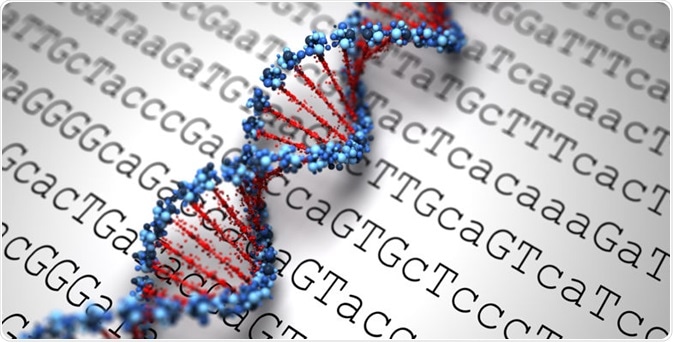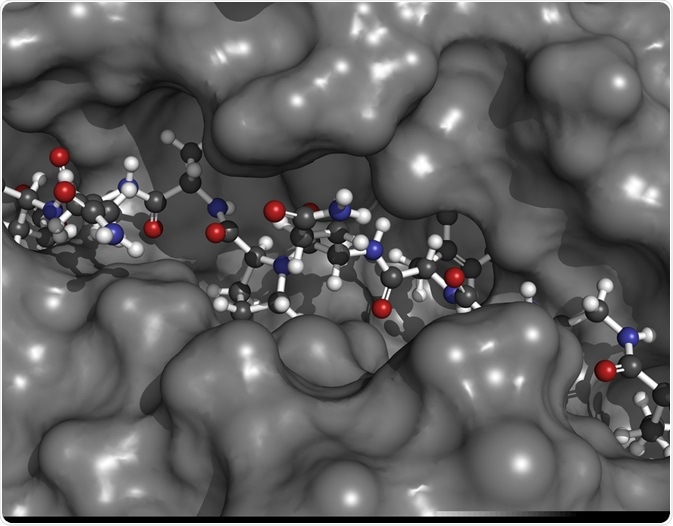Studying the interactions between genetics and the different components that make up the immune system, as well as the immune response, is together termed as immunogenetics.

Image Credit: https://www.rcpath.org/profession/committees/histocompatibility-immunogenetics.html
This branch of medical genetics not only covers the genetic controls that regulate the normal functioning of the immune system but also includes the study of immune system disorders which are a result of genetic changes and variations.
What is the Major Histocompatibility Complex?
A significantly researched area in immunogenetics is the major histocompatibility complex (MHC). This is because the MHC plays a fundamental role in the normal functioning of the immune response and disorders related to the immune system including autoimmune disorders.
In humans, the major histocompatibility complex, which is often also referred to as the human leukocyte antigen system, is located on chromosome 6 and is a region that covers more than 200 genes.
MHC Class I and II molecules
Genes contained within the MHC region code for proteins that are important in the adaptive immune response. For example, several genes in the major histocompatibility complex are responsible for encoding class I and class II MHC protein molecules. These MHC protein molecules are an extremely significant component of adaptive immunity as they enable immune cells such as T lymphocytes to detect infected host cells, for instance, macrophages that have engulfed invading microorganisms.
In the case of macrophages, MHC molecules, specifically, class II MHC molecules, enable the stimulation of the immune response by binding to the peptides of engulfed microorganisms that macrophages have presented on their cell surface. This then allows the site of invading microorganisms to be recognized by immune cells and so initiates the adaptive immune response.

Image Credit: StudioMolekuul/Shutterstock.com
MHC Class III molecules
Genes contained within the major histocompatibility complex are also responsible for coding other key components of the immune response including cytokines and complement proteins. These elements are categorized as being class III MHC protein molecules.
Although the functional role of class III MHC molecules are less defined when compared with class II and class III molecules, they too have been determined as having an important role in the generation of the immune response. Together, the genes contained within the MHC and the proteins that they code for enable the specialized elimination and attack of invading microorganisms.
Therapeutic targets for Immune System Disorders
Immunogenetics research has in part revealed the genetic basis behind immune system disorders and therefore led to research to determine potential therapeutic targets for these disorders.
However, there remains a vast area of unknown knowledge and research surrounding this area. This is primarily because there is large variability in the genes regulating the immune system in the MHC region from individual to individual. Therefore, it can be very difficult to predict the immune response various individuals will present with even when individuals are infected with the same infectious agent.
The different gene variants in MHC class I molecules between individuals are associated with changes in the severity of autoimmune and infectious diseases that patients can present with.
However, research determining which gene variants result in increased/decreased disease severity is lacking and largely undetermined. However, Debbe et al., 2020 proposed an approach to identify gene variants that are considered to have a greater association with disease.
In the study, Debbe et al., 2020 showed that it could potentially be possible to predict the specific immune cells that are strongly associated with MHC class I disorders through the analysis of receptor-ligand interactions.
The group of researchers proposes this approach is feasible as the ligand receptor's interactions of immune cells occur within varying regions of the MHC according to the specific immune cells that are involved. Debbe et al., 2020 also reasons that they were able to effectively apply this approach to immune system disorders including human T-cell leukemia virus type one, Chron’s disease, and Hepatitis C virus.
Immunogenetics and Transplantation Outcomes
Another area in which immunogenetics is considered key is with regards to the outcome of transplantations. The initiation of the adaptive immune response in response to organ transplantation is evident. This response is principally attributable to the MHC molecules presented on the cell surface of the transplanted donor organ cells.
However, the genetic variability of the MHC in various individuals has been shown to affect the immune response presented in patients that have received organ transplantation. Hence, more research untangling the genetic behind these variations in the immune response after transplantation is necessary to better predict the outcome patients will have following organ transplantation.
Conclusion
Immunogenetics is a vast area of research concerning the genetic basis behind the immune system and the immune response in both wellbeing and disease. The huge genetic diversity and variability of the genes involved in the regulation of the immune system have meant that it is difficult for researchers to effectively investigate these genes and their functions concerning health and disease.
Nevertheless, more emerging studies have enabled a much better understanding of how genetics controls the immune system and the immune response. Hence, providing the potential to better identify genetic-driven therapeutic targets for immune system disorders and infectious diseases.
References:
- Christiansen, F.T., and Tait, B.D. 2012. Immunogenetics: Methods And Applications In Clinical Practice. Humana Press Incorporated.
- Debebe, B., Boelen, L., Lee, J., Sanders, E., Anzala, O., Kamali, A., Kaleebu, P., Karita, E., Kilembe, W., Inambao, M., Lakhi, S., Allen, S., Hunter, E., Edward, V., Fast, P., Price, M., Gilmour, J., Tang, J., Thio, C., Astemborski, J., Kirk, G., Khakoo, S.,
- Donfield, S., Goedert, J., and Asquith, B., 2020. Identifying the immune interactions underlying HLA class I disease associations. eLife, 9, pp.1-43.
- Kulski, Shiina, and Dijkstra, 2019. Genomic Diversity of the Major Histocompatibility Complex in Health and Disease. Cells, 8(10), pp.1270-1278.
- Wieczorek, M., Abualrous, E., Sticht, J., Álvaro-Benito, M., Stolzenberg, S., Noé, F., and Freund, C., 2017. Major Histocompatibility Complex (MHC) Class I and MHC Class II Proteins: Conformational Plasticity in Antigen Presentation. Frontiers in Immunology, 8, pp.1-16.
Further Reading
Last Updated: Nov 4, 2020